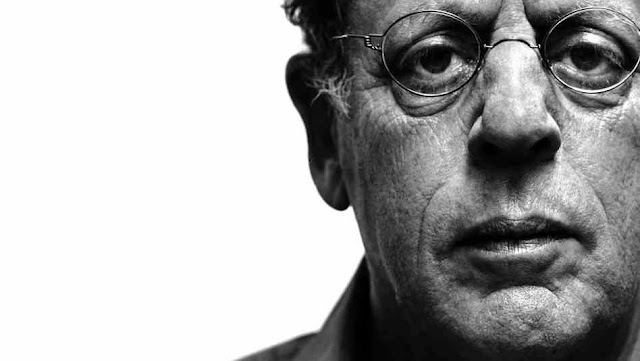I am always going to be tempted by a concert of Philip Glass' music whether it is a small opera like The Penal Colony or a large concert piece like Music in Twelve Parts. The Études for Piano fell somewhere in the middle; a happy middle.
I did not know the works at all beforehand though as they were composed by Philip Glass that did not matter. I have a great deal of stuff by him on CD, probably more than for anybody else, except possibly for David Bowie and Neil Young, and I love all of it in all of its forms.
One of my very favourite of these is Solo Piano, because of the simplicity and the purity of the music, so I was even more excited than usual at the prospect of more piano piece.
The clincher, if a clincher was needed, was that Glass would be playing some of the pieces himself.
 I had been to the Barbican Hall a few times before, mostly for gigs by the likes of Sparks and Van der Graaf Generator, so I was content to take a seat up in the Balcony. I had been forced, out of desperation, to be up there for a recent Sparks gig and that had worked out
I had been to the Barbican Hall a few times before, mostly for gigs by the likes of Sparks and Van der Graaf Generator, so I was content to take a seat up in the Balcony. I had been forced, out of desperation, to be up there for a recent Sparks gig and that had worked outwell.
And so I found myself in Balcony seat A33 for £22.50.
I did well to bag that seat quickly as the event sold out. Much like Sparks, Glass is a fringe American act who is surprisingly popular over here.
On the day my planning went a little awry and I went to our Reading office for the day. That was not a problem for getting to the theatre but it did mean that my evening meal was the all too familiar pasty picked up in Reading Station when passing through.
I had been to the Barbican quite a few times before so I knew that I would get confused inside and it took a little exploration to find the box office to collect my ticket and then to find the correct door for the hall. I did not mind that at all as the Barbican is a nice place to wander around and I had plenty of time to do the wandering.
Once I got to my seat I took the usual photo to show the view that I had and, as you can see, it was very good. I was particularly pleased to be able to see the keys which meant that I would also be able to see the hands in motion.
The task of playing the twenty Études for Piano was shared with Maki Namekawa, Timo Andres, Clare Hammond and Vikingur Ólafsson. Musically they sounded similar, as I think they should have done given that they were all playing pieces by the same composer, but there were big differences in the way that they sat (height and distance) and in the way that they moved their arms.
Part of the fun was watching how they each behaved and that included the walk on and off as well as the playing in the middle. Ólafsson caused some involuntary laughter as he got lost walking off stage the first time.
The concert was split into two halves with ten Études either side of the interval and each pianist playing two piece in each half. They playing order was not quite as expected and went Glass (Études 1 and 2), Hammond (3 and 4), Ólafsson (5 and 6), Namekawa (7 and 8), Andres (9 and 10), interval, Hammond (11 and 12), Ólafsson (13 and 14), Andres (15 and 18), Glass (16 and 17) and Namekawa (19 and 20).
I've not said much about the music so far as there is not much that I can say lacking the musical knowledge and terminology to do anything like a forensic analysis. What I can say was that it sounded much like his other solo piano works, and I mean that as a high compliment. It had the familiar, and much loved, structure of subtle changes applied to a rhythmic repetitive base.
It sounded like you expect Philip Glass to sound. This was Minimalism 101 that also managed to be catchy, pretty and was very much appreciated by the packed hall.








No comments:
Post a Comment
All comments are welcome. Comments are moderated only to keep out the spammers and all valid comments are published, even those that I disagree with!